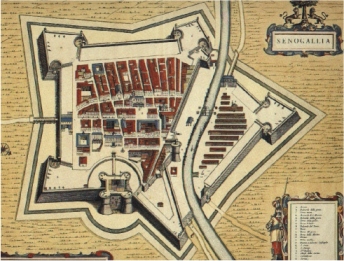

Senigallia, my city, in a paper of' 500th century
Middle age: distance or proximity?
Many times I have reflected upon the history of the Middle Ages and I have often found aspects of the institutions, inventions, philosophy, spirituality that can be useful also to our spirit. The Middle Ages was in fact an era of strong passions, of contacts and clashes among different histories, cultures and religions. They were contacts and clashes first between the Latin and Germanic tradition, then between European Christianity and Arabic-Turkish Islam, or between nomadic and resident societies. Medieval people, thus, experimented political, economic and intellectual forms to carry out a new synthesis, which was originated by the division of the Mediterranean Sea between Christian North and Muslim South, between Latin West and Greek-Slavic East, between northern and Mediterranean populations. Such divisions and tensions subsist today still.
Also at a spiritual level, the expansion of the Benedictine monachism and the birth of the Mendicant Orders (Franciscans and Dominicans) left evident signs with the development of monasteries and cathedrals built in Romanesque and Gothic styles , while hundreds of pilgrims moved between the West and the East, by earth and sea, giving birth to roads of communication and institutions of hospitality and care. Moreover, medieval intellectuals confronted one another, according to the religious differences between Latin and Greek, Christians and Muslims, in a magnificent intellectual development which gave origin to the first universities. Last, but not less important, there was the development of rural castles and municipal civilisation, typical invention of medieval Italy. Today, therefore, the Middle Ages are said to have been above all a time of great experimentations. This might be the reason why they are not so different from our times. We also, in fact, are experimenting new techniques, new ways to live and communicate, a new pluralism of people, races, religions. We now wonder, therefore, if we have moral, social and spiritual points of reference, so as to be able to face the challenges of the new millennium.